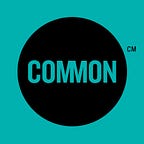Redefining Business
By Mark Eckhardt, Edited by Julia Dopp
Over four years into my tenure as Co-CEO of COMMON, I’ve found that many of the people I work with defy definition. I’ve come to realize that the label “social entrepreneur” is far too constricting to ever encompass all the people who have been inspired by the movement. These diverse, engaging, forward-thinking people who have dedicated themselves to the betterment of the planet and all the creatures on it may have emerged as little more than a novel subset of the business world, but they have developed into much more than that, a growth that isn’t reflected in our current vocabulary.
Descriptors are usually added to known terms or phenomena to distinguish the subset from the whole, implying minority status. We see it everywhere, from ethnicity to food. For example, while it would make sense to suggest Italian food for dinner, describing a dish as “Italian lasagna” would strike most people as silly, as we inherently infer that lasagna is an Italian dish. Likewise, if you have a pet Labrador, you would find yourself on the receiving end of some odd looks if you tried to clarify that your Labrador is, in fact, a dog. Every day, we unconsciously divide the world around us into categories and subcategories, and use our language to describe where the differences lay. Believe it or not, this language pattern is where we hit the root of the problem when it comes to social business: social business shouldn’t have to be distinguished from business as a whole by the desire to improve the world. Let’s remove the modifier, and let’s redefine the whole.
All businesses should be social businesses. In fact, they already are, given that every organization impacts society consciously or unconsciously. In our current lingo, social businesses are simply those that have a positive impact. This begs the question, shouldn’t all businesses be a positive source of development in the world? Would anyone willingly patronize a company that was designed and operated with malevolent intent toward humanity? Of course, and of course not. The paradox lies in the established norms of cost/benefit analysis, wherein we’ve grown to accept far more (and know far less) than we should regarding the businesses we patronize, simply because any alternative way of doing things seems impractical. A willfully blind mindset has developed alongside modern conceptions of currency, and as a result a large percentage of us have resigned ourselves to eating, wearing, and otherwise using products that are developed in ways we can’t bring ourselves to face.
Recently, as a reaction and an alternative to the profit-centric values of traditional capitalism, socially conscious businesses arose from the fringes of commercialism. As rebels often do, social entrepreneurs received a flux of attention and interest and a significant surge of popular approval. Yet, as the movement has grown and the hype has subsided, the substance of the movement has shifted away from the novelty of the edge and toward the core of the business model. We now exist in a liminal space, where we are faced with the pressures of large-scale operations, without the clear-cut direction and established funding of more traditional ventures.
To illustrate the rebellious notions of redefining business, allow me to quote another controversial thinker: “each generation must, out of relative obscurity, discover its mission, fulfill it, or betray it.” Revolutionary, writer, and philosopher Frantz Fanon used these words to illustrate his disdain for stagnant society, the rigidity of which forbids progress by default. The world of commerce has become such a society, wherein the prescribed measurements of action and success leave alternate modes of business in a gray zone of otherness, outside the norms and therefore outside the realm of perceived possibility and profit. Those of us who think otherwise may not be a typical generation, as we are not united by age or by country of origin, but we are alike in that we exist within a general society that believes our plan for a better world is outside the realm of possibility. Our mission is to prove otherwise, by showing that the seemingly natural state of current capitalism is just as malleable as any other human construction.
In order to change business from the inside out, and redesign commerce as a vehicle of positive social change, we have to find a way to immerse ourselves in the current business culture while maintaining our values and propelling change. It’s a tall order.
Nevertheless, if we recognize that it’s not only undesirable but impossible to exist indefinitely in an isolated niche on the outskirts of the world economy, we have to square ourselves to the task of altering the atmosphere of business altogether. It’s easy to feel overwhelmed, and it’s easy to feel that the odds are stacked against you, when you consider the gargantuan challenges that lay before us. We’re not here to tell you that it will be an easy road to success, because we’re not here to promote something other than the truth. But we are here to declare with you that it’s a noble task, a necessary one, and (most important), an achievable one.
To that end, never forget that together, we can be fearless.
Like This? Sign Up For Our Newsletter.
COMMON is a creative accelerator for social businesses and projects, designed to catalyze and promote products and ideas that take care of the planet and all the creatures on it. To learn more visit www.common.is, or write us at: itmatters@common.is
